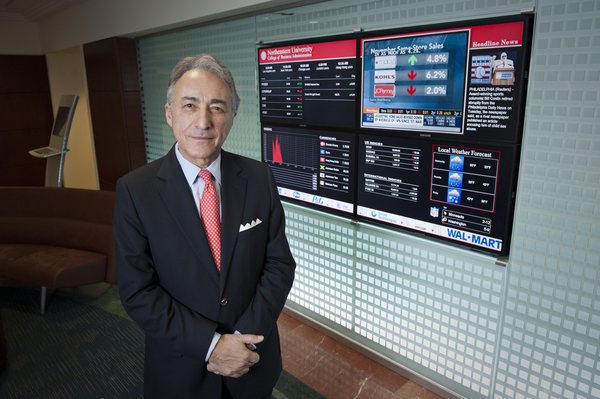3Qs: Investigating the trading loss at JPMorgan Chase

Last week, JPMorgan Chase announced that it had suffered significant trading losses, which are expected to top at least $3 billion. The announcement caused the company’s stock prices to plummet and reminded many of the Lehman Brothers’ failure in September 2008. On Wednesday, the FBI confirmed that a preliminary investigation into the trading loss has been launched. We asked Joseph Giglio, executive professor of general management in the College of Business Administration, to explain what happened and what affect it may have on the financial industry.
What led to this massive loss at JPMorgan Chase? Does it surprise you?
The exact nature and size of the trading loss is still unclear. Apparently, JPMorgan Chase owned a large portfolio of corporate securities, and to insulate themselves against potential losses, they bought credit default swaps — basically insurance policies against a drop in the portfolio’s value. Then, when the economy seemed to be improving, it decided that rather than unwinding some of the swaps, it would make a huge bet on the other side of the market. Was this strategy a hedge or proprietary trading? JPMorgan claims the costly trading strategy that led to the loss was a hedge rather than proprietary trading, a bet with the bank’s own money. We should learn after several independent investigations whether this is the truth.
No one should be surprised by the loss. These deals are too opaque for senior managers to understand and regulators to evaluate. Also, the reward system for a trader is designed with minimum downside on developing these trading strategies. Even when there are sanctions for a truly catastrophic loss, the penalty will be a loss of a job and never loss of a single dollar of compensation. A year from now, the few individuals fired by JPM will have found attractive positions at another financial institution. For sure, there were more than three senior people responsible for the JPM loss. But senior management is clearly not a fan of Harry Truman, who had the following sign on his desk: “The buck stops here.”
How will the JPMorgan Chase crisis impact the financial industry?
The JPMorgan Chase losses on its trading activities have renewed calls for stricter regulatory oversight of all the big banks. The advocates of tougher regulation have been emboldened to tighten regulations. For example, the banking industry’s efforts to dial back the Volker rule — which restricts big banks’ ability to trade for their own account — has been severely undermined. Put differently, the banking lobby efforts to implement a watered down Volker rule have been weakened. Also, the JPMorgan Chase loss has reinforced the Federal Deposit Insurance Corporation’s position that risky activities should be separated from traditional commercial banking activities of taking deposits and making loans. It’s a good bet that regulators will start probing comparable trading strategies at other large banks despite the fact that most of them passed stress tests last year.
Still, a word of caution: The last time I looked, the banks’ lobbying and fundraising capacity remains intact, and they are still in a strong position to take undue advantage of poor, unsuspecting politicians.
Has the banking industry become more responsible since the Great Recession and this is an isolated situation, or does it reflect problems that still linger?
The need for reforms is still as great and urgent as before the financial crisis. Until the big banks understand that they have responsibilities to customers, employees, and other stakeholders beyond simply maximizing shareholder and senior management value, you can assume that business as usual will continue. Of course, we have to jettison the so-called performance-pay reward systems that incentivize risky behavior with impunity. Let’s not forget that price signals (compensation levels) from Wall Street are almost as loud as they had been before the financial crisis. Closely related, nothing will change with the big banks until we restrict their freedom of action by outlawing certain financial instruments. Also, we need to get away from an environment where regulators exist to protect the interests of the regulated.
Finally, as long as the banking industry understands that money produces results in Washington, if you expect major substantive change, I have a bridge to sell you in Brooklyn.





